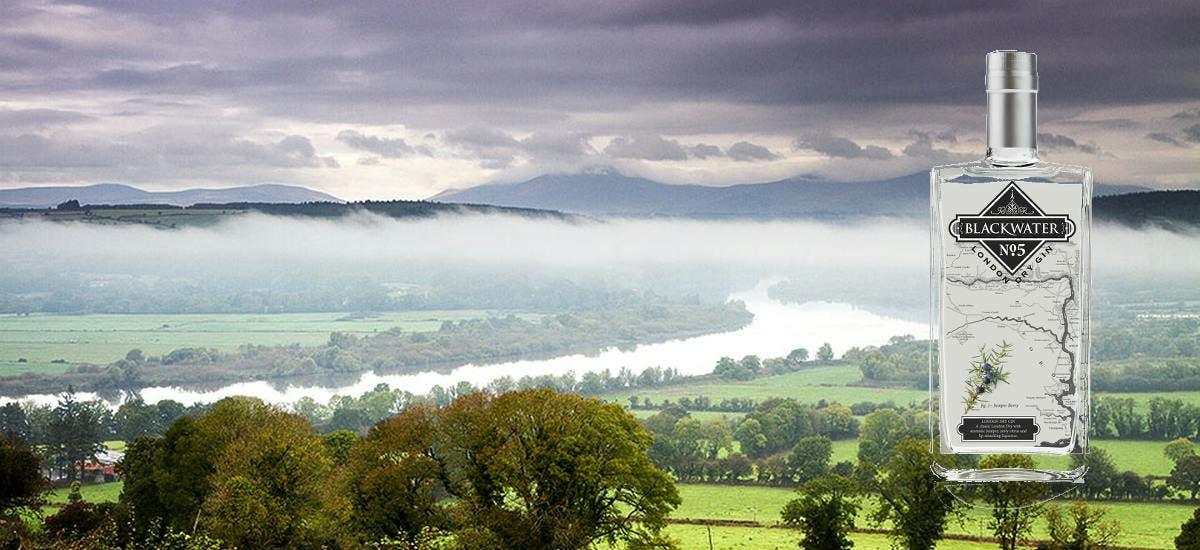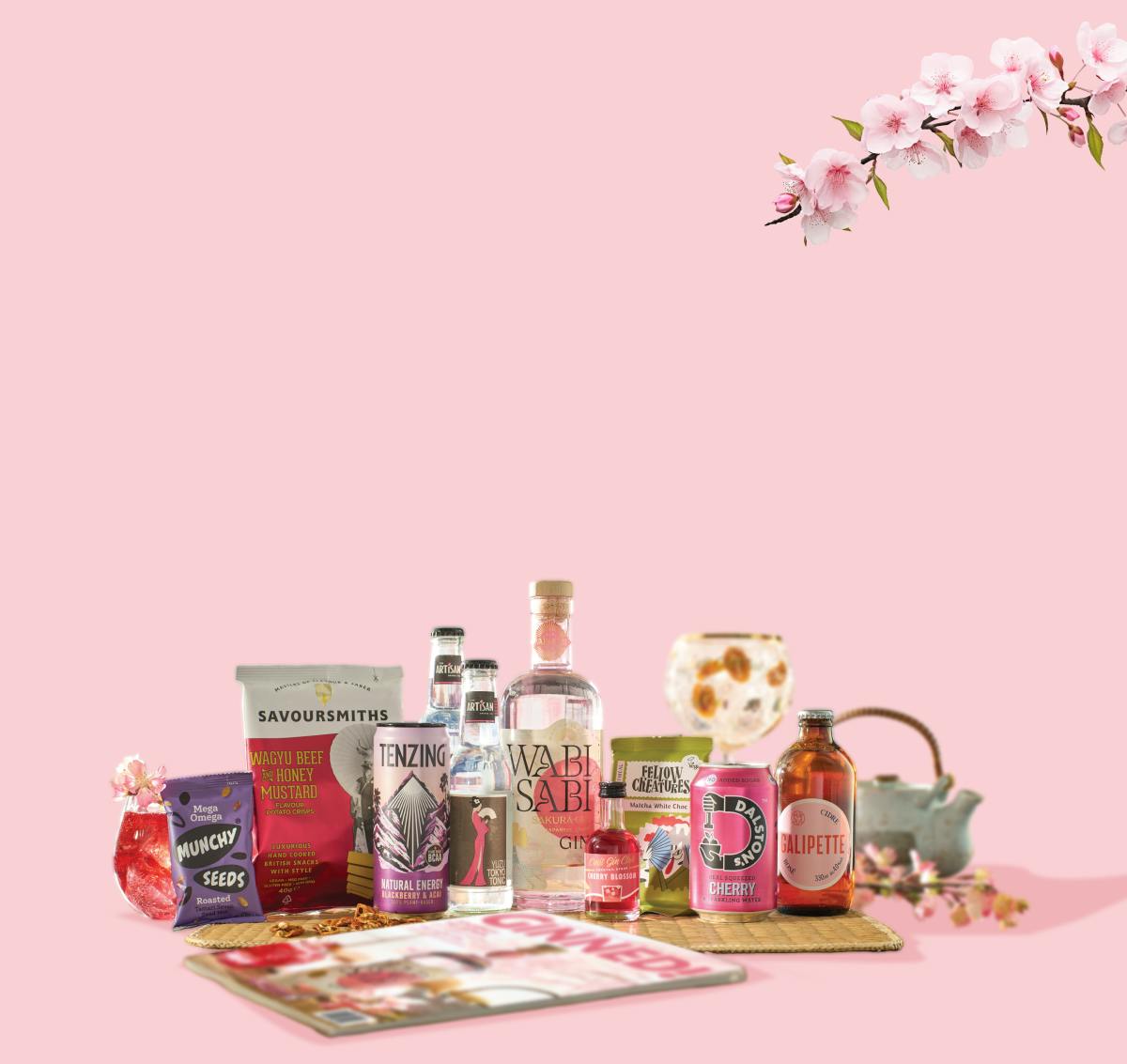
GIN OF THE MONTH: IRELAND'S FIRST CRAFT GIN BLACKWATER Nº 5
Below is an excerpt from GINNED! Magazine about Blackwater Distillery's Nº 5 London Dry Gin. Every month, Craft Gin Club members receive a bottle of amazing small-batch gins accompanied by GINNED! Magazine which is full of features about the gin, the distillery and loads of fascinating features.
After months at sea, braving torrential storms while cutting through choppy deep ocean waters like gin through tonic, the Schooner Hellas returns from China, navigating around Hook Head into the estuary formed by the exit of the Rivers Suir, Barrow and Nore into the Atlantic Ocean and up towards Waterford, its home port. At Waterford, a man named White walks the block from his King Street office to the banks of the River Suir and the shipyard he created there to view the exotic treasures brought back in the wooden belly of his fastest ship. One of those treasures: 2,099 chests of tea bound for the Bewley family in Dublin in its successful attempt to break the tea monopoly held by the East Indian Company.
But tea is not the treasure of interest to you, dear Blackwater No. 5 Gin drinker.
The 1835 voyage of the Hellas described here was one of many that White’s ships took to the far East, returning each time with new finds including herbs and spices, some of which traveled to the families occupying the banks of the Blackwater River not far to the West of Waterford. Ships entering the Blackwater from the Celtic Sea would work their way up to a 90 degree bend in the river at Cappoquin, the village in which today you’ll find “Ireland’s First Craft Whisky & Gin Distillery”, Blackwater Distillery.
A LOCAL GIN FROM DISTANT LANDS
As the distillery’s proprietor, Peter Mulryan, mulled over his options for producing the first Irish craft gin, he decided that the trend towards local ingredients seen in the UK’s burgeoning craft distilling industry was not what he was after. “Gin is a drink of the Empire,” feels Peter. “It’s all about bringing in different herbs and spices from around the world just as it was done centuries ago.”
But even if Blackwater Distillery’s gin doesn’t forage for botanicals in the Cappoquin area or use Irish juniper, the spirit is steeped in the rich local history of Victorian era spice trades.
The Blackwater River Valley is a particularly Anglo part of Ireland, a well-off region full of wealthy families including the Cavendish family, a British aristocratic institution since the 16th Century. The family, headed by the Duke of Devonshire, owns Lismore Castle which sits on the river, which kings have visited since the mid-1700s and which is but one of a number of castles and manor houses that dot the Blackwater’s banks. These domiciles afforded the region the nickname “The Irish Rhine” while the wealth in the area afforded the families all of the exotic spices they could import from the far East, some of which have disappeared from the valley.
As he dug into the Irish maritime archives discovering the stories of White’s of King Street (today known as O’Connell Street), and the myriad products that used to flow up the rivers Suir and Blackwater, Peter discovered that a number of botanicals once imported to the area had fallen out of favour with the locals. The drinks historian that he is, Peter decided to find these shunned spices and test them to see if and how they would fit into the gin he had in mind. After sourcing the spices, Peter distilled each one separately to see how they would react in a spirit. “Some of them were just terrible,” remembers Peter. But two of the lost spices were “brilliant”, bringing “a spicy middle bit” that today is the core of Blackwater Gin.
For the pleasure of drinks adventurers and the pain of those wary of ingesting things unbeknownst to them, the two botanicals that join to form Blackwater No. 5’s double-helix will remain a secret. “One of them you’ve probably heard of,” says a sly Peter, “but I have my doubts that you would have heard of the second.”
All told, it took the Master Distiller nine months to develop his first gin for commercial sale with the recipe really only coming together when he found his two little secrets. A small two-litre still at his home served the initial purpose of finding the right recipe which, along with the two botanicals and gin standards like juniper and coriander, includes bitter almond, green cardamon, and liquorice.
Why No. 5? “Each of the gin formulations I worked on were numbered,” explained Peter. Batch No. 5 evolved into variations 5a, 5b, etc. so the Craft Gin Club’s March Gin of the Month is actually the great-great-grandchild of the final formula.
True to the Distiller’s mantra that gin ingredients come from around the world, Blackwater No. 5’s base hails from France where Peter found the wheat spirit he sought. “I could have used whey alcohol from down the road which would have been much easier and cheaper,” explained Peter, “but the extra spent on the clean, French wheat spirit is very important to the final product.”
AN IRISH WHISKY MAN’S GIN CONVERSION
Just how important was that quality wheat spirit base? Important enough for a gin convert that “just wanted to make a really good gin.”
Peter is a convert because he once held a strong dislike for gin, as do many of his countrymen to this day. The reason for the Irish tongue’s general dislike of the spirit is due to the nature of the only Irish gin they grew up with, Cork Dry Gin. From it’s history, the Irish gin doesn’t sound so bad. Dating back to 1793, Cork Dry Gin was originally produced by the Watercourse Distillery. Just as the spices in Blackwater No. 5’s heritage came up the river to Cappoquin, the botanicals used to make Cork Dry Gin came in through the port of Cork while the grain to distill a spirit with were sourced from local farms. Over time, the distillery joined with others in the area, eventually falling under the umbrella of Irish Distillers, itself owned by multinational drinks giant Pernod Ricard since 1988.
Thanks to this heritage, Cork Dry Gin remains the largest selling gin brand in Ireland. But that’s not to say that quantity begets quality. Reviews of the gin are largely dismal with Peter remembering his experiences with the gin’s taste as “ghastly”.
Now he’s finding the upsides to having a less-than-respected spirit as the dominant market player - there’s nowhere to go but up! Peter first discovered “real” gin with well-known whisky writer, Dave Bloom. As Peter didn’t like gin because of his Cork Dry benchmark, Bloom’s suggestions opened a whole new world to the Blackwater Distiller, a world in which he’s now entered in competition with Pernod Ricard in an attempt to move the Irish gin up the quality ladder. “The Irish have a very low opinion of gin. I’m one trying to change that opinion.”
As you get to know Ireland’s first craft gin this March - a gin whose first commercial batch came off the still on February 9th of this year and which is not yet available in the UK - we’re sure you’ll taste Peter’s ambition.







